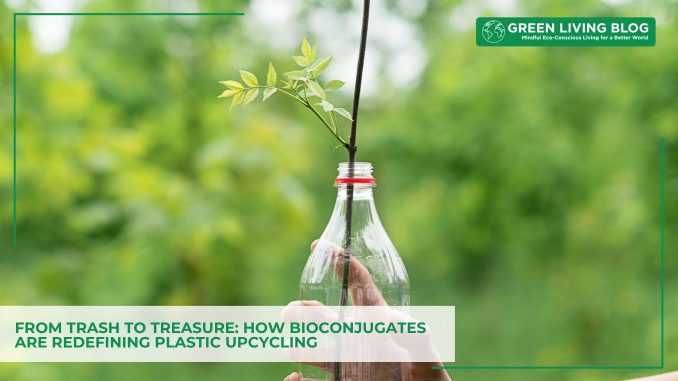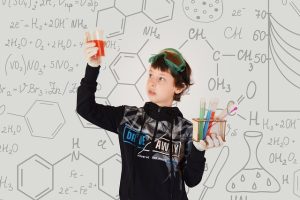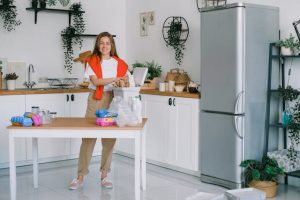
Over 8 million tons of plastic waste enter our oceans every year which poses a severe threat to ecosystems and the marine life that they contain. This alarming statistic demonstrates the urgent need for new solutions to be developed to help tackle our plastic pollution problems.
An approach which is gaining a lot of attention is the use of bioconjugates, small molecules that provide a new way to handle plastic waste. By chemically linking biological molecules with synthetic materials, bioconjugates have the potential to transform discarded plastic waste into usable materials.
This new method could change the way that we approach plastic upcycling and contribute significantly to better environmental sustainability.
What are Bioconjugates?

Bioconjugates are small molecules in which natural biomolecules are joined with other synthetic or natural substances to create new molecules with improved properties. The vast number of combinations possible means that bioconjugates are very versatile and can be used in a wide range of applications.
Most commonly, we see small biomolecules such as enzymes and proteins joined to other materials for medical engineering applications. In more recent years, however, tailored bioconjugates have become increasingly popular in a wide range of industries, including environmentalism.
More specifically, in the field of plastic upcycling, bioconjugates have become an area of interest. Bioconjugates can be designed to break down plastic polymers, making it possible for them to be reused in a new application. This is very important for reducing waste and making our current recycling processes more efficient. With bioconjugates, numerous different plastics can be transformed time and time again.
Enzymes are a good example of bioconjugates in action. Take PETase enzymes, for example, which are molecules that have been designed to break down poly(ethylene terephthalate), or PET, which is a plastic that is used for many household products including packaging and textiles. PETase enzymes can speed up the recycling process, making it more accessible and sustainable.
Bioconjugates in Plastic Upcycling
Bioconjugates are changing the landscape of plastic upcycling, and they interact with plastic polymers to break them down or transform them into useable byproducts.
Research is advancing to extend the capabilities of bioconjugates into a wide range of plastics. Different types of plastics require different recycling processes due to their chemical compositions, and so bioconjugates must be tailored to each individual plastic. There are exciting developments in upcycling a broader range of plastics like polyurethanes and polypropylene. Research is focused on creating bioconjugates that can tackle materials that were once considered non-recyclable.
Genetic engineering is playing a crucial role in this field. By improving bioconjugates, scientists can increase their efficiency and effectiveness. A notable example is the development of engineered enzymes capable of degrading tough plastics such as polystyrene, offering promising solutions to plastic waste.
Benefits of using bioconjugates for plastic upcycling

When industries choose to use bioconjugates for plastic upcycling, they reduce plastic waste significantly. Bioconjugates improve how efficient and sustainable our recycling processes are by turning otherwise discarded materials into reusable resources. By using naturally occurring biological molecules, the recycling process becomes greener overall meaning that the ecological footprint of a product’s lifecycle is reduced.
Bioconjugates make recycling more economically viable by turning waste into high-value products. Instead of considering plastics as mere trash, industries can see them as potential sources of revenue. This approach encourages investment and innovation because it aligns economic incentives with environmental goals.
Through bioconjugates, your plastic waste could be converted into biofuels, chemicals, or even novel bioplastics. These end products hold higher market value, effectively turning these waste materials into assets. This transformation not only cuts costs but also opens up new markets for recycled products, something that is becoming increasingly popular in our eco-conscious world.
Challenges and the Road Ahead
Though bioconjugates for plastic upcycling have had a promising start, there are still some challenges that need to be overcome before we start to see them being used frequently in industry.
A big issue in the use of bioconjugates in general is their stability and efficiency in real-world applications. Bioconjugates often require specific conditions to function in the way that they were designed to, and they can degrade if they are used in extreme temperatures or at specific pH levels.
Additionally, bioconjugates are still relatively new and so they can be expensive to make due to the complex technology required. This means that currently, they can only reasonably be used on a small scale. This is likely to change as our knowledge of bioconjugate synthesis improves and we develop new, easier methods for making these molecules at scale.
Research into bioconjugates must continue to advance so that they can become a commonly used tool in the plastic recycling industry. As scientists work to improve their functionality and reduce costs, these innovations have the potential to revolutionise plastic waste management.
![]()
Author Profile
- Online Media & PR Strategist
- Blogger and Educator by Passion | Senior Online Media & PR Strategist at ClickDo Ltd. | Fascinated to Write Lifestyle Blogs in News & Education I have completed a journalism summer course at the London School of Journalism and manage various blogs.
Latest entries
 Green GuidesMay 29, 202519 Best Eco-Friendly Products, Services & Gifts – With Special Deals
Green GuidesMay 29, 202519 Best Eco-Friendly Products, Services & Gifts – With Special Deals List postMay 28, 202510 Everyday Items with PFAs (‘Forever Chemicals’) and Green Alternatives
List postMay 28, 202510 Everyday Items with PFAs (‘Forever Chemicals’) and Green Alternatives List postMay 22, 20258 Eco-Friendly & Energy-Saving Home Gadgets for Daily Routines
List postMay 22, 20258 Eco-Friendly & Energy-Saving Home Gadgets for Daily Routines Green LivingMay 15, 20258 Healthy BBQ Swaps for a Cleaner, Greener, Guilt-free Grillfest
Green LivingMay 15, 20258 Healthy BBQ Swaps for a Cleaner, Greener, Guilt-free Grillfest






Leave a Reply
You must be logged in to post a comment.